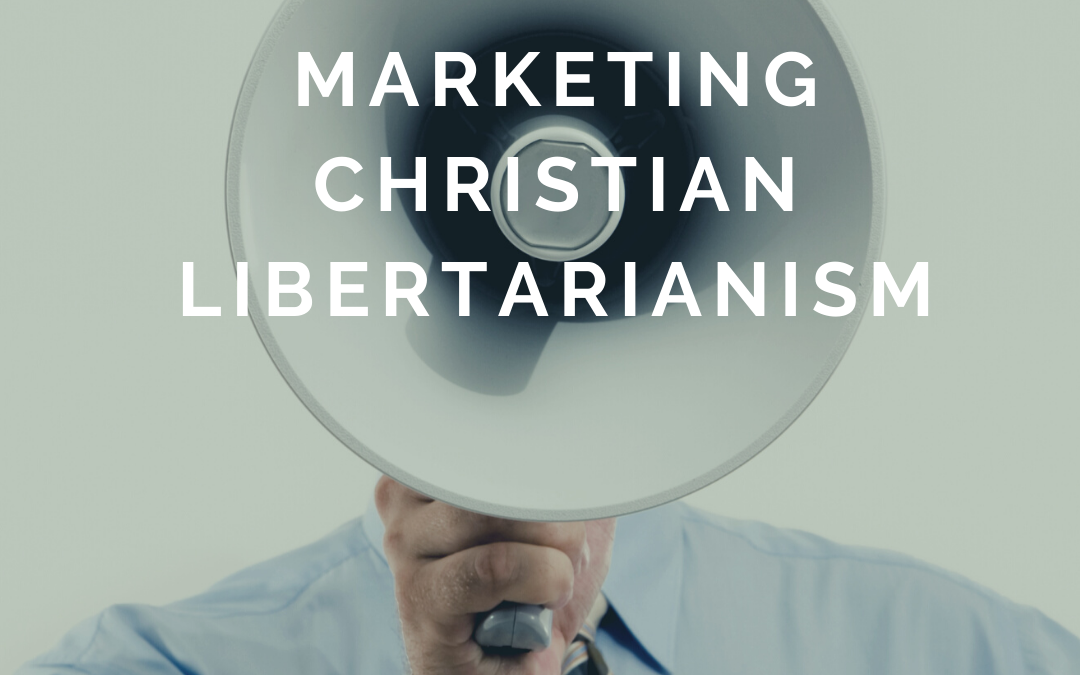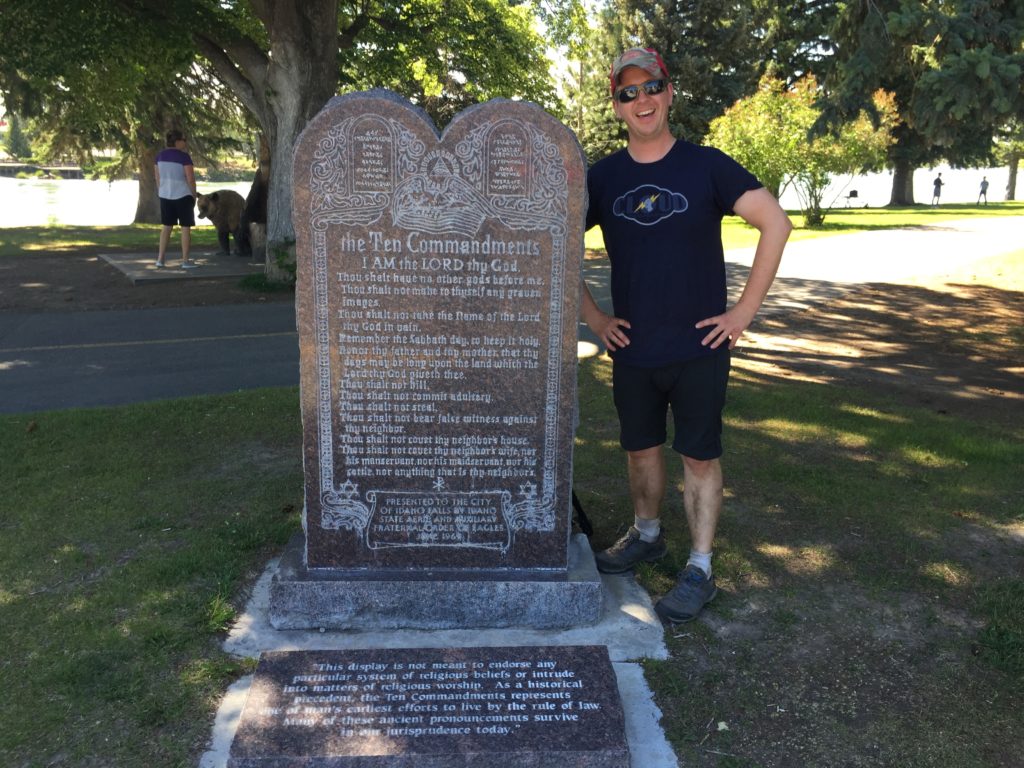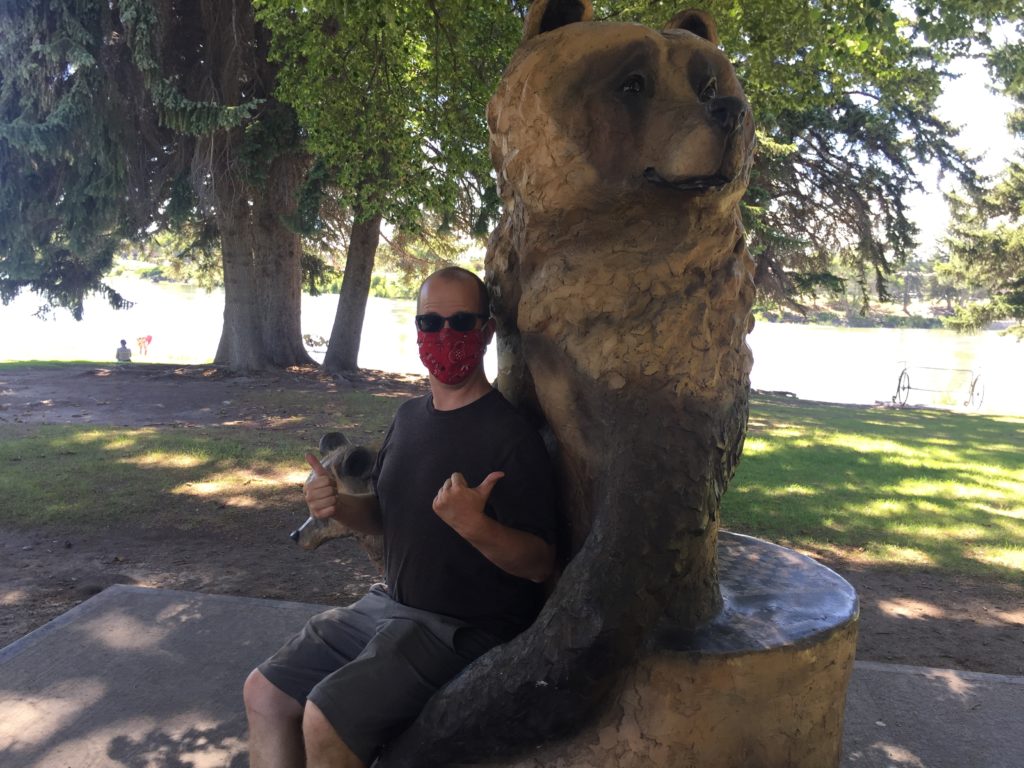
S3:E29 Marketing Christian Libertarianism

Chris standing in front of the Ten Commandments Monument in Idaho Falls 
A lovely bike path next to the water 

Nick with his beloved bear statues 
Wolf statues in the park 

The war memorial in the park 

The man-made falls next to the park
Donate to help keep Truce going. Visit www.trucepodcast.com/donate for information
James Fifield was a pastor, radio personality, publisher, and outspoken libertarian. He hated the New Deal and its restrictions. His organization, Spiritual Mobilization, created a marketing campaign that would bond Christianity to capitalism and the United States for decades to come.
Also… you know those Ten Commandments monuments all over the country? Well, it turns out that many of them were built to advertise for one of the highest grossing movies of all time: Cecil B. Demille’s “The Ten Commandments”.
Helpful links:
- List of Ten Commandments monuments placed by the Eagles
- Ten Commandments trailer featuring Cecil B. Demille
- One Nation Under God by Kevin Kruse
- The Evangelicals by Frances Fitzgerald
Discussion Questions:
- Is it creepy when corporations tell people how to behave?
- Do you like it when companies tie religion to business?
- Is Christianity an individualistic religion? A collectivist one? Neither? Both?
- Does Leviticus 25:10 mean that we have a right to liberty? Or does it mean something else?
- Should monuments to the 10 Commandments be allowed on public land?
PARTIAL TRANSCRIPT (note: this may not be exact)
This episodes is part of long series about how communism in Russia impacted the American Christian Church. It can stand on its own, but when you’re done, go back and start at the beginning of season three.
We started this season talking about the rise of communism and socialism. Then moved to capitalism, even spending a fair bit of time on labor unions, workers rights, and some more liberal ideas. The New Deal, a clear example of Social Gospel ideals in the political realm. Now we need to talk about the impact of Christian libertarians.
What is libertarianism? Like any ideology, there are lots of variations. So many! But there are recurring themes. Generally, it is the idea that the government should stay out of people’s lives as much as possible.
Taxes? No! Or, at least, they should be bare minimum.
Restrictions on trade? Get out of here! Commerce, manufacturing, and business of any kind should be left to the whims of the market.
Is a company is behaving badly? Then people will just stop going there and put it out business. Sounds easy enough. But, like I said, that is a generalization.
After the Great Depression, the US saw the rise of prominent Christian libertarians. They were there before, of course, but programs like those of the New Deal sparked concern in their minds. Because Congress and FDR were starting to crack down on big business. The minimum wage, safety standards, not to mention protection for unions. All of that would be bad for corporations. And some saw it as atheistic communism seeping into American life. So they fought back… through advertising.
That’s right, today we’re going to explore the weird world of religious advertising. And how libertarian ideas have been spread through the media in the last eighty years. It’s a story of religion, big business, one of the greatest blockbuster movies of all time, and the Declaration of Independence. Well… an edited version, anyway.
You’re listening to the show that uses journalistic tools to look inside the Christian Church. We press pause on the culture wars in order to explore how we got here and how we can do better. I’m Chris Staron. This is Truce.
December 1940. The National Association of Manufacturers held their big conference. In attendance were people from Rockefeller’s Standard Oil, General Electric, General Motors, Sears… all the big shots. It was an industrial conference held during the Great Depression, just before the US joined World War II. The Russians and Germans had already invaded Poland. The German themselves took control of Norway, Denmark, Belgium, France, and others. The Soviets were well established in Russia. Meanwhile, these big wigs hobnobbed. Suits. Ties. Firm handshakes.
BUSINESSMAN: Good to see you Johnson, how’s that business case treating you?
BUSINESSMAN: Humbug. Quarterly projections. Synergy. Market Cap.
I don’t know… I’m not a business guy. Just guessing there.
Think about these businesses. They had a lot to lose with the New Deal. If you were going to hand-pick a group of people who probably didn’t like the FDR’s plan, it would be the National Association of Manufacturers.
Someone invited a minister to talk. Kinda weird for a manufacturing conference, right? But the Reverend James Fifield bowled them over. Passionately preaching against the New Deal. Leaders of industry had been told they were the reason the Depression happened. Fifield was there to tell them that they were not the problem, but our salvation.
Essentially Fifield’s argument against the New Deal goes something like this:
- It infringes on god-given liberty
- The New Deal makes a false idol of the government. Instead of looking to God for your help, it encourages citizens to turn to their government.
- It leads poor people to covet. The New Deal makes poor people want to take away the things that rich people have.
- It bears false witness. It’s a lie because it will not be able to come through for the people.
There were a few more reasons libertarians like Fifield were against it.
- Evangelists in the 17 and 1800’s emphasized salvation as an individual experience. You have to make a personal commitment to God. Therefore, the logic goes, Christianity is individualistic. So if you want to make a Christian society, honor the individual. Communism, socialism, and the Social Gospel were looking after the collective. Therefore, we should go the other way. Trumpet the rights of individuals. It’s a weak argument, but a popular one.
- And, of course, The New Deal was seen as evidence of creeping socialism in this country. It’s easy to mock this now as alarmist, but with communists murdering millions of their own people in Russia… and communism is the utopian version of socialism, then socialism seemed like a logical first step to inviting that kind of persecution into the US.
Fifield was an instant success at the National Association of Manufacturers. According to historian Kevin Kruse, capitalism and Christianity had often been compared. But Fifield’s innovation was, and I’m quoting here, “the insistence that Christianity and capitalism were political soul mates”.
His is not to the opinion of all Christians. Many Christian leaders like FDR saw the New Deal as the Christian thing to do. But today is about Christian libertarianism.
The world had not heard the end of James Fifield.
He was the pastor of a church of 4,000 people in Los Angeles, the largest Congregationalist church in the world8. It had a drama club, radio ministry, and college-level courses. It was also known as the church for the well-connected. People like legendary filmmaker Cecil B Demille. One chronicler of Fifield described him as the “Apostle to Millionaires”9.
Fifield was paid the equivalent of a quarter of a million dollars a year in today’s money. He printed a full-page ad in the LA Times denouncing the New Deal. Before you yell, “fundamentalist!” hold your fire. He wasn’t a fundamentalist. Instead, he believed you could pick and choose what parts of the Bible applied. And that capitalism and Christianity were the same because, in his mind, both allowed you to succeed or fail on your own merits. Again, also hard to believe when Jesus spent so much time with the poor. But I digress.
It wasn’t just his preaching that made him famous. Fifield started “Spiritual Mobilization”, an organization that disseminated his speeches and ideas. Here is something that has really struck home while researching this season… big organizations like this are basically marketing agencies. So was the Moral Majority in the 1980s. All of their influence came from their ability to spread their ideas far and wide. Spiritual Mobilization sent tracts to over 70,000 ministers in the US condemning the New Deal.
It read, in part:
“We ministers have special opportunities and special responsibilities in these critical days… America’s movement toward dictatorship has already eliminated checks and balances in its concentration of powers in our chief executive.”
Catch that? Fifield straight up implied FDR was a dictator. Someone get Fifield a mic so he can drop it. He also opposed the US’ entry into WWII. His advisory committee was a who’s who of the politically connected. Leaders of the US Chamber of Commerce, the largest lobbying organization in the country, and Norman Vincent Peale, author of “The Power of Positive Thinking” and future pastor to the Trump family.
The organization was backed by millionaires like the founder of the Firestone tire company and J. Howard Pew Jr, president of Sun Oil.
Spiritual Mobilization faced a problem, though. It wasn’t enough to just mail out materials. People could see the money behind it. They needed it to feel like a grassroots campaign. They had to get ministers involved. What better way to get pastors on their side then a shared enemy?
Have ministers see the threat that faced them. So they enlisted over 10,000 clergy as representatives at the local level, to make it seem less like a highly-financed propaganda campaign and more like an organic movement. Once they did that, requests for materials written by prominent libertarians and politically connected people like former president Herbert Hoover, started pouring in. Encouraging ministers to preach on themes hand-picked by Spiritual Mobilization.
Another way to get ministers to talk on these themes was to hold a sermon contest. In October 1947 they encouraged clergy to write a sermon on the theme, “The Perils to Freedom” and you could win $5,000. Which is about $57,000 in today’s money. Something like 15% of all of the clergy in the country sent in a submission. That’s a lot of influence. And if you wrote a sermon, why not preach it? Think about that title: The Perils to Freedom. The title alone invokes fear, and also because it’s preached from a pulpit, people will equate freedom in this country with Christianity. Pastors could also preach the sermon that won. Sounds innocent enough, right? Let’s be upfront about this, though… this was big business-sponsored patriotism. Fed by fear. When preached from a pulpit, those messages felt like part of a grassroots movement. Even though the contest was sponsored by some of the largest companies in the world seeking to keep their assets, discourage labor unions, and anything that restricted a free market.
Messages weren’t just spread by pastors, radio broadcasters were required to air a certain amount of public service announcements. Meaning, radio stations were hungry for anything to play during those times. It would be expensive to produce their own… why not get them for free?
Spiritual Mobilization filled that need with their regular 15-minute program, “The Freedom Story”. It featured cautionary tales of government overreach, praising moments in history when the government didn’t regulate industry. While also touting the benefits of religion. By 1951 the broadcasts were heard on more than 800 stations. Much of it financed by a Steel Manufacturer.
They also started a monthly magazine called Faith and Freedom that claimed it was an open marketplace of ideas for ministers. But ended up repeatedly denouncing the minimum wage, price controls, veterans benefits, Social Security, and unemployment insurance. As well as the Social Gospel.
The magazine supposedly didn’t “back” a candidate but put forth a bunch of questions to lead you in a certain direction. “If it proposes to take the property or income of some for the special benefit of others, does it violate the Commandment: “Thou shalt not steal?’ If it appeals to the voting power of special interest groups, or to those who have less than others, does it violate the Commandment: “Thou shalt not covet they neighbor’s house?”
In 1951 Spiritual Mobilization’s leaders decided that for the 175th anniversary of the Declaration of Independence, that the nation should celebrate with events throughout the country. So they formed the Committee to Proclaim Liberty. They enlisted celebrities from Ronald Reagan and Walt Disney, Bing Crosby, and Cecil B Demille to Herbert Hoover and General Douglas MacArthur. Once again, the event was to be sponsored by corporate America, United Airlines, J.C. Penny, and Fred Maytag.
It was veiled with patriotism, but was essentially an opportunity to preach libertarian conservatism. The main thrust of the event was the encourage people to read the Declaration of Independence out loud. Sounds great, right? Well… here is where it gets weird. The Declaration spends some time outlining King George’s refusal to let the colonies pass laws. They wanted more government, but George wouldn’t let them. Get that? The colonies wanted to form more government. I’ll prove it. This is from the Declaration of Independence:
“He has forbidden his Governors to pass Laws of immediate and pressing importance.”
and
“He has dissolved Representative Houses repeatedly, for opposing with manly firmness his invasions on the rights of the people.”
They were upset that George was shutting down their government. They wanted more government. Which doesn’t really work with libertarianism. In order to get around that, the committee edited those parts out.
The celebrations were held all over the country. With CBS’s radio network airing a special tribute organized by Fifield and movie director Cecil B Demille and starring Jimmy Stewart, Gloria Swanson, Bing Crosby, and Lionel Barrymore. The promotional photos featured the phrase, “Freedom Under God Will Save Our Country”. General Matthew Ridgeway, paused his duties fighting in Korea to insist that the founding fathers had been motivated by their religious faith.
You’ve probably noticed some similarities between my stories about of the Pledge of Allegiance Abraham Vereide. The focus on people in power, organized patriotic celebrations, the mixing of religion and politics. I know it’s hard to layer these stores on top of each other, but Vereide, Fifield, and Billy Graham’s early career overlapped. The inhabited the same world. Tying Christianity to capitalism, and capitalism to the United States. Creating public displays of piety that would later bolster the Christian America camp.
Fifield wasn’t the only one marketing religion in America. In towns all across the country there are literal monuments to this movement. In parks and government buildings. Monuments meant not only to advertise morality and religion… but also a blockbuster film.
We’ll continue our story after these messages.
COMMERCIAL BREAK
In Minnesota 1947 a young man stole the family car and went out for a joy ride. In the process, sadly, he struck a pedestrian. At his court hearing, the judge had an unorthodox idea: have the boy learn the Ten Commandments.
Sounds like a good idea, right? There are a lot of good life principles there. Don’t steal. Don’t lie. Don’t covet. All good things. The judge didn’t stop there. He figured it would be good for all Americans to learn these principles. So in 1951 he, along with the the Fraternal Order of the Eagles, started placing framed copies of the Ten Commandments in schools and court houses around Minnesota. Now these important rules could be seen in public places by anyone who could read.
Don’t forget – societies need people to act in a moral fashion. That’s just a reality. And religion could accomplish that. That’s what the American Founding fathers thought too, though they weren’t really specific on which religion.
This story caught the ear of one of the most powerful men in Hollywood: Cecil B. Demille.
Demille was a regular attender at James Fifield’s church, and a supporter of the Spiritual Mobilization movement. He directed Bible films like Samson and Delilah and King of Kings, and produced even more. He even made an appearance as himself in the classic black and white film “Sunset Boulevard”, one of my personal favorites.
Demille and Fifield had a lot in common. They were both Christian libertarians. They both hated the New Deal. Ha-ted. Demille also did not get along with unions. And Hollywood is full of unions. When he testified before the House UnAmerican Activities Committee in 1945 he compared unions to Naziism, Fascism, and Communism. The Demille Foundation for Political Freedom was partially dedicated to fighting unions. Including advocating for right to work states.
You know, I don’t think he liked unions that much.
Bible films did really well in this era. DeMille decided to remake his own earlier Ten Commandments movie. This one would go on to become the 8th highest-grossing film in history when adjusted for inflation. And it wasn’t just Christians who went. The Ten Commandments appeals to Christians, Jewish people, and Muslims alike since the story appears in all three traditions. Meaning… a much bigger market than a strictly Christian film. In fact, the head of research for the movie used texts from all three religions to fill in gaps. Because, listen, the Bible account is kind of cut and dry. How are you going to fill a whole movie with a text that takes twenty minutes to read out loud?
They also invented some stuff. Like the idea that Moses grew up as a Prince of Egypt.
The story of Moses is pretty compelling. A young boy escapes murder, floats down a river, only to be saved and raised in the Pharaoh’s palace. That same boy from an enslaved tribe grows up to lead his people to freedom.
LOUD: Let my people go!
Defeating an evil empire with a powerful tyrant leader by following God’s commands.
What other evil empires do we know of? Oh yeah, the Nazis, Fascists, and Communists. It’s no accident that a libertarian chose to remake this picture during the Cold War and soon after WWII. There’s even a trailer you can see, I’ll post it on the website where Demille himself steps in to advertise for the film. He says:
DEMILLE: “Are men to be ruled by God’s laws? Or are they to be ruled by the whims of a dictators, like Rameses II? Are men property of the state? Or are they free souls under God?”
The final words spoken by Moses in the movie quote scripture. And not just any scripture, but the same one printed on so many of the materials distributed by Fifield’s Spiritual Mobilization: “ Proclaim Liberty Throughout All the Land, unto All the Inhabitants Thereof.”That’s Leviticus 25:10, and the same verse inscribed on the Liberty Bell.
It doesn’t have a whole lot to do with liberty the way you think of it. It’s actually part of a command to keep the year of Jubilee from the Old Testament. Something Christians don’t do. Anyhow…
In preparation for the launch of what would become one of the biggest movies of all time, someone had a bright idea… wait a second… the Fraternal Order of the Eagles is already distributing paper copies of the Ten Commandments… we could build monuments across the country and advertise for the movie at the same time.
And that’s what they did. Demille had taken a trip to Israel and at Mount Sinai, where Moses received the Ten Commandments, and he picked up a piece of red granite. Kept it as a souvenir. So it was decided that the monuments should also be made of red granite. From Wisconsin. They didn’t ship it all the way from Israel.
Together with the Eagles, they donated 4,000 6-foot high red granite monuments of the Ten Commandments. Four thousand! That’s a lot of monuments. The film producers arranged for the actors from the movie to appear at some of the unveilings. Yul Brynner went to the first of these in 1955. Charlton Heston attended another in North Dakota where 5,000 people turned out for the unveiling.
There’s even a list of where you can find monuments in your area. I’ll post a link to it on our website. I looked up the closest one to me and took a drive to see it for myself.
[Audio of a trip to Idaho Falls]
It’s hard to believe that monuments all across the country were erected, in part, as part of a movie campaign. But it’s true. And not just any movie, but one that encouraged Americans to fight government control. Directed by a guy who believed in small government, and didn’t like the Social Gospel’s attitudes expressed in the New Deal.
There are a lot of reasons I wanted to tell you about these advertising campaigns.
- It’s important to note that they were driven by commercial interests. Not by a grassroots sense of piety. General Motors, General Electric, and Union Carbide were all sponsors of Fifield. And a Hollywood film was a driving force behind our Ten Commandments monuments. Which is their legal right. But some people find the connection a little spooky. Big companies sending out messages about how Americans should behave, and not being up front about where those messages were coming from. Yeah… that’s spooky. Because those corporations benefit when Americans avoid unions, and social programs like a minimum wage.
- These ads distinctly tie America to capitalism and religion. The Spiritual Mobilization ads did it with words, the monuments by simply being on public land.
- The Spiritual Mobilization ads placed the onus of their messages on individuals. Not on social change. Not on labor movements, laws, or protests. On the individual. And that’s what Moses is in the films, one man creating change. The thing that doesn’t work for me is that Moses then founded a nation with some pretty strict rules. From how to settle disputes to how to treat menstruating women. That doesn’t sound very small government to me… anyhow. The movie ends before he gets to that part.
- The movie and monuments targeted Muslims, Christians, and Jews. In other words, they didn’t tell you which faith to follow. We like to characterize this era as a purely Christian one. As far as the ads go… It wasn’t. It was religious without being specific. Don’t forget that. There is a huge difference.
I think it would be cool to live in a world where faith was in the public eye. But make no mistake: when our religion is mixed with corporate interests, it will blow up in our faces. And 2020 has been a year where those bonds are fairly obvious. Think back on the year so far: when has religion been tied to corporate interests? Think about it… think about it…
Massive campaigns can urge us toward a saving faith in Christ, something I believe in. We can celebrate that. But let these stories give you pause. Are we okay with corporate interests dictating our behavior? Our religion? Media literacy is something we Americans are just not good at. But we can get better. It begins by examining the messages within the ads themselves. What are the motivations within the ad? Where did the money come from? Who stands to benefit? And, when our faith is used in advertising, what are they equating with Christianity? An economic model? A social bias? A certain country?
Are we okay with our faith being mixed with others to sell movie tickets? When are we making Christ known, and when are we being taken for a ride?
Special thanks this week to Nick Staron and Gannon Castle for being my sounding boards. Some of the resources for this episode include “One Nation Under God” by Kevin Kruse and “The Evangelicals” by Frances Fitzgerald. We’re going to continue talking about advertising Christian America in an upcoming episode. I hope you’ll subscribe so you get every new episode as its released.
This week on our website we’ve got so many bonus features. A link where you can locate the Ten Commandments monuments near you. Take a picture with one and tag us on social media! You can also see pictures of the one in Idaho Falls that I visited this summer. You’ll find that ad with Cecil B. Demille talking about the Ten Commandments. So much stuff! You can find it at www.trucepodcast.com.
While you’re there, remember that this podcast is listener supported. You’re not going to hear stories like this in other Christian outlets. If you like what you hear and you’d like to partner with us, head over to trucepodcast.com/donate to learn how.
This week I want to encourage you to join our email list. You’ll get a updates on our release schedule, behind-the-scenes looks, and links to download our Media Fast and Empire curriculum. And it’s free!
You can also learn all about my movies, “Bringing up Bobby” and “Between the Walls” and my novel, “Cradle Robber”.
Thanks for listening. God willing, we’ll be back in two weeks with more. I’m Chris Staron. This is Truce.
